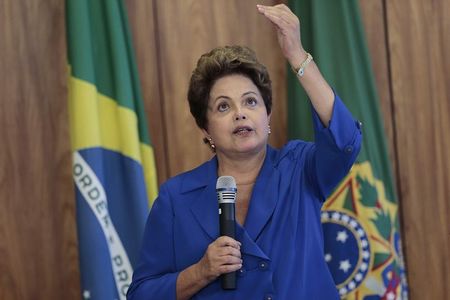By Brian Winter and Anthony Boadle
SAO PAULO/BRASILIA (Reuters) - President Dilma Rousseff expects a bribery scandal at state-run oil company Petrobras to deteriorate in coming months, aides say, with arrests possible for some political allies and potentially serious damage to an economy that is already struggling.
Prosecutors say corrupt officials siphoned billions of dollars from Petroleo Brasileiro SA (SA:PETR4), as the company is formally known, into the coffers of several parties including Rousseff's Workers' Party.
The probe has already resulted in the arrest of two former Petrobras officials as well as executives from eight of Brazil's 10 biggest construction companies, which prosecutors say were part of the scheme. More arrests are expected.
"The only thing we know is that things will get worse," a senior official close to Rousseff told Reuters.
Rousseff was chairwoman of Petrobras' board from 2003 to 2010, but she has denied any knowledge of graft and opposition parties have ruled out seeking her impeachment for now.
An uncharismatic career civil servant who has largely shunned the backroom dealing common in Brasilia, Rousseff will not try to stop the investigation from sweeping up guilty politicians, even those from her party, aides say. Local media say as many as 70 members of Congress could be implicated.
"We want this investigation to go forward in full," she said in a speech Thursday. "Brazil will come out of this stronger."
Rousseff is more worried about limiting the damage to the economy, which suffered a light recession earlier this year and faced the possibility of another one in 2015 even before the scandal broke.
However, the official said "there aren't many good options," and that the ball appears to be primarily in the court of prosecutors and the companies involved.
Under local law, companies found guilty of bribery can be barred from doing business with the government for two years.
Yet the construction companies under investigation are so big, with combined revenues of 150 billion reais ($58 billion) and projects from hydroelectric dams to preparations for the 2016 Olympics in Rio de Janeiro, that broad suspensions could badly damage the economy.
The companies are also major suppliers to Petrobras, which would struggle to find alternatives to execute projects.
Just a 10 percent cut to Petrobras' investment budget could cause Brazil's economy to grow 0.5 percentage points less next year, some economists said.
The scandal has nudged Rousseff towards appointing a more market-friendly figure as finance minister who will try to keep investment from falling even further, aides said. An announcement is expected later Friday.
GOVERNMENT IS 'STUNNED'
Some in Brasilia have accused Rousseff of largely disappearing from public view since being re-elected on Oct. 26 and say she should be more actively identifying and firing officials involved and taking more concrete steps to restore investor confidence, such as announcing budget cuts.
"The government is stunned. It is completely paralysed and rudderless," Senator Jose Agripino, leader of the opposition Democrats Party, told Reuters.
A congressional leader for the Brazilian Social Democracy Party (PSDB), the biggest opposition party, filed a motion with judicial oversight bodies on Thursday to fire Petrobras CEO Maria das Gracas Foster.
Yet Rousseff has, so far, stood by Foster, who has been described as one of her only close friends in public life.
The director of Brazil's comptroller general said the body could hand down a suspension of government contracts for construction companies convicted of corruption.
"The risk exists," Jorge Hage told Reuters on Friday. "It's the law."
To avoid such a ban, Hage said guilty companies could have to negotiate a deal in which they would return illicitly gained money, renegotiate contracts that included bribes, and identify individuals who received bribes.
"We hope they all have the good sense to take steps to repair the damage done," Hage said.
That could require some degree of coordination among the companies. Some politicians have suggested the government could informally help broker such a deal but it would need the kind of negotiating finesse and communications skill that Rousseff has not shown.
Recent developments suggest Rousseff and other parties may have some leeway to manage the crisis.
An assistant to the judge overseeing the Petrobras case told Reuters this week that the investigation could continue for two years or more. A trial could take even longer in a country where big cases often drag on for more than a decade.
The economy has also shown some bright spots, with inflation slowing a bit and unemployment hitting a new monthly low in October, although other data shows payrolls shrinking.
Aides to Rousseff are hoping for a repeat of 2011, when a wave of smaller corruption allegations actually led her popularity to rise because she fired some involved.

"The fight against corruption has never been as strong as it is now in my government," Rousseff said Thursday. "There is no pressure at all from the government to block investigations."
(Additional reporting by Brad Haynes; Editing by Kieran Murray)